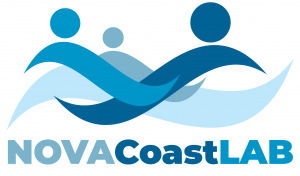
NOVACoastLAB group develops innovative research in the environment and sustainability areas, climate change, sustainable urbanism and active community involvement processes, with a special focus on coastal areas. The NO-VACoastLAB team have an extensive experi-ence in multidisciplinary research and guides its activities to respond to society problems and challenges, through the implementation and reflection supported by participatory pro-cesses that mobilize multi-stakeholders in col-laborative contexts. In this way, it contributes to the construction of new forms of govern-ance in public policies, in areas such as the environment, spatial planning, environmental planning and management.
Integrated in the Marine and Environmental Sciences Centre (MARE) and based at the NOVA School of Scienc-es and Technology of the NOVA University Lisbon (FCT-NOVA), NOVACoastLAB's activity is structured in three main lines of research: Risk Evaluation and Management and Civil Protection; Green Infrastructures and Urban Sustainability; and Governance, Active Citizenship and Social Laboratories.
Research Lines
Risk Assessment and Management and Civil Protection
Coordination: José Carlos Ferreira
The Risk Assessment and Management and Civil Protection component encompasses a team of researchers in the scientific areas of integrated coastal zone management, risk assessment and monitoring in coastal munici-palities, sustainability and resilience of coastal communities to climate change. Its main lines of activity are:
• Develop innovative methodologies for assessing hazards, vulnerabilities and risks associated with ex-treme weather events and their integration in risk and emergency management plans for coastal cities and communities, in order to contribute to the improvement of public policies for vulnerable territories;
• Generate methodologies for forecasting erosion, overtopping and delimitation of flooded areas, as well as supporting the response to emergency situations involving overtopping and erosion events;
• Create methodologies and strategies for Adaptation to Climate Change and Plans and Strategies for Adaptation and Civil Protection;
• Promote Oceanic, Coastal and Risk Education and Literacy in order to increase the resilience of coastal communities.
Practice areas: Adaptation to Climate Change, Risk Assessment and Management, Sustainability and Resilience Strategies, Risk Perception and Communication, Oceanic and Coastal Education and Literacy, Risk Literacy, Modelling and Remote Sensing and Public Policies.
Green Infrastructure and Urban Sustainability
Coordination: José Carlos Ferreira
The research team in research line of Green Infrastructure and Urban Sustainability contributes to the promo-tion of the population's quality of life, focusing on the development of methodologies that offer nature-based solutions, and the main actions focus on:
• Contribute to reinforcing the importance of biodiversity and ecosystems in public policies, through the development of innovative methodologies for the definition and implementation of green infrastructures in vulnerable and urban territories;
• Develop instruments for sustainability, valorisation and management of the territory based on ecologi-cally based planning models and instruments that allow obtaining ecological, economic and social ben-efits, mitigating the negative effects of climate change;
• Demonstrate and promote the importance of green infrastructure through the enhancement of ecosys-tem services, ecological structures, green corridors, the multifunctionality of territories and the land-scape and green incentives;
• Promote and participate in scientific research projects and management and territorial valuation instru-ments, namely in Sectorial Plans, Municipal Master Plans, Detailed Plans, among other sustainability projects and strategies;
• Promote Education and Literacy on Biodiversity, Sustainability and the importance of ecosystems for a resilient society.
Practice areas: Green infrastructures, Ecological Structures, Green Corridors, Biodiversity, Ecological-based planning and management, Adaptation to climate change and ecologically-based solutions, Assessment of ecosystem services, Urban Ecosystems, Sustainability Strategies and Urban Resilience, Education and Literacy for Biodiversity and Sustainability, Planning and land management, Modelling.
Governance, Active Citizenship and Social Laboratories
Coordination: Lia Vasconcelos
The team of researchers in the Governance, Active Citizenship and Social Laboratories area develops circular processes supported by innovative techniques of participation, collaboration and co-construction, consensus building and multipart mediation. Its actions focus on:
• “Collaboration and Empowerment” processes - through the development of group dynamics that pro-mote a genuine dialogue, supported by the knowledge(s) of those involved. It aims to facilitate the col-laboration and empowerment of participants, creating communities of practice and contributing to the construction of innovative collaborative strategies and policies. Thus, it promotes the construction of collective intelligence and social capital, enhancing social transformation.
• Critical Reflection Processes - by theorizing from practice when critically evaluating/reflecting on the processes, extracting lessons learned in an action-investigation attitude to ensure the continuous im-provement of techniques/methodologies and processes in a circular way. This is reflected in a continu-ous exercise of action-investigation and action-research that contributes to a constant growth of scien-tific knowledge expertise.
• Training and collective learning - promoting technical training through collaborative and dynamic tools fostering emancipatory learning for those involved in diverse areas such as facilitation, conflict resolu-tion, marketing and communication. The creation of informal and dynamic spaces induce creativity and they are preferential generators of social, intellectual and political capital.
Practice areas: Active Public Participation, Collaborative Governance, public policies, co-construction process-es, conflict resolution, joint solution building for complex problems, in areas such as environment and sus-tainability, planning and urbanism, environmental management, and Environmental Literacy.